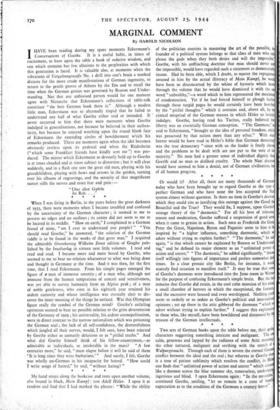Two sets of German books upon the table before me,
their go characters suggesting something intricate and malignant. The ° calm, generous and lapped by the radiance of some Attic morning the other tortured, malignant and seething with the stench of Walpurgisnacht. Through each of them is woven the eternal G conflict between the ideal and the real ; but whereas in Goethe di is a tone of patient sublimity which resolves the conflict, in Hid one finds that "unlimited power of action and unrest" which scr like a daemon across the blue summer sky, remorseless, undeviau ingenious and blind. I open Eckermann again : "In the meantioe, continued Goethe, ,smiling, "let us remain in a state of hope expectation as to the condition of the Germans a century hence."


























 Previous page
Previous page